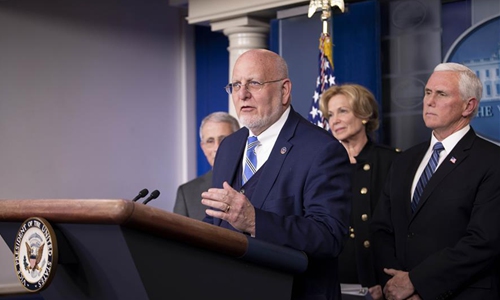HOME >> CHINA
Time for US to be 'completely open and transparent' in combating COVID-19: netizens
By Zhang Hui and Gao Lei Source:Global Times Published: 2020/3/5 12:23:21 Last Updated: 2020/3/5 21:43:21

Director of the U.S. Centers for Disease Control and Prevention(CDC) Robert Redfield (front) speaks during a press conference with members of the White House coronavirus task force in the White House in Washington D.C., the United States, on March 2, 2020. CDC announced Monday that there are currently 91 cases of COVID-19 in the country, up from just 60 cases a day ago. (Xinhua/Liu Jie)
The US Centers for Disease Control and Prevention (CDC) has now become the focus of criticism of Chinese netizens, with many slamming US politicians for being critical of China's lack of transparency and openness while their CDC is guilty of the same thing.The CDC on Monday stopped reporting the number of people who have been tested for the virus, giving the reason that its numbers did not reflect all those being tested nationwide as different states were testing and reporting their own results. It has been fiercely rebuked in the US for its delayed response and unpreparedness in dealing with the COVID-19 outbreak.
The total number of confirmed cases in the US stood at 129 by Wednesday according to the CDC, but some US media quoting statistics from the Johns Hopkins University said the number was at least 137.
Many are wondering how bad the outbreak really is in the US, speculating that the actual situation might be worse than what US authorities have described.
California declared a statewide emergency on Wednesday after its first fatality from the novel coronavirus, bringing US fatalities to at least 11.
Two days after the CDC failed to resume the reports on testing, the topic started trending on China's social media Weibo on early Thursday, with many Chinese netizens saying the US was deceiving itself and hiding the real number and the overall epidemic situation.
"We hope that every country that has information, this includes China, will be completely open and transparent," Chinese netizens said, citing a statement made by US Secretary of State Mike Pompeo in February to comment on what the CDC has failed to do, urging the US to be "completely open and transparent."
An ironic cartoon featuring US President Donald Trump downplaying the virus outbreak has been circulating widely on Weibo. In the cartoon, Trump, looking nonchalant and making an OK gesture, said, "I don't test", "It's flu" and "Go hoard guns."
Some Chinese netizens and scholars also criticized US politicians for only caring about their political gains, the presidential elections and US stock market, but doing little to contain the spread of the virus, urging them to immediately take strong measures to contain the further global spread of the virus.
In the US, the CDC has irritated many Americans, who complained on social media such as Facebook under the CDC page that it has been giving people false and insufficient information, and as a public health agency, has failed the US citizens, with its already severely compromised credibility now completely gone.
The CDC first set strict criteria on who can be given the nucleic acid test, then later said the test kits weren't working as expected, leading to inconclusive results.
Some US netizens expressed panic as they believed the CDC is withholding information, and the whole situation could be much more severe, while some suggested its government learn from China and other countries by cancelling school and stepping up entry measures.
There are also US people with underlying conditions seeking help and health advice from the CDC under its Facebook page, but apparently, no one has yet received any response from the center.
Robert Murphy, an infectious diseases professor in the US and executive director of the Institute for Global Health at the Northwestern University Feinberg School of Medicine, told the Global Times in an email on Wednesday that he agreed with some opinions saying the CDC has been making same mistakes as Wuhan did at the beginning of the outbreak, which included narrow testing criteria, slow testing speed and lack of testing capacity resulting in the delayed response.
He said that the delay has been problematic for the US, and the consequences are exactly the same as those experienced by China: community spread of the virus. But he believed that it will probably not be as severe, however, because "the mistakes are being addressed quickly now and the US has a more resourceful medical infrastructure."
Posted in: SOCIETY